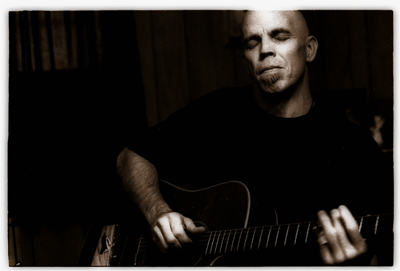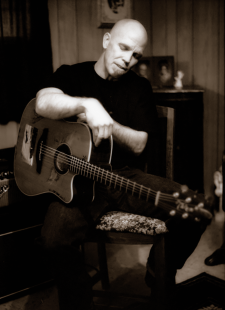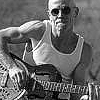Blues guitarist Kirby Kelley was down to his last guitar, a custom-made Paul Reed Smith. “Think about it,” said Kelly’s friend at the North Dallas Guitar Center when the musician laid the instrument, which was worth enough to help his family out of a deep financial hole, on the counter and said he wanted to sell it. “Think it over.”
 Kelley had quit the music business. He was burned out—tired of bad deals with promoters and club owners. He had either sold or pawned twenty-eight lap steel, acoustic or electric guitars to pay bills. “Every month he would ask how much we needed and then he’d come in with the money,” Kelley’s wife Peg said. “He never said what h ewas doing but I knew.” Selling the Smith was a last resort. “That was a very humiliating and painful thing to do,” said Kelly. “Paul meant for me to play that guitar, made it especially for me, and I really felt that I was letting him down.”
Kelley had quit the music business. He was burned out—tired of bad deals with promoters and club owners. He had either sold or pawned twenty-eight lap steel, acoustic or electric guitars to pay bills. “Every month he would ask how much we needed and then he’d come in with the money,” Kelley’s wife Peg said. “He never said what h ewas doing but I knew.” Selling the Smith was a last resort. “That was a very humiliating and painful thing to do,” said Kelly. “Paul meant for me to play that guitar, made it especially for me, and I really felt that I was letting him down.”
Robbie Gustin, the friend at Guitar Center who would not take Kelley’s last and most valuable instrument, has his own story to tell about the edge of life and salvation. After drugs and depression brought him to his knees, he believes one of the reasons he was saved was to be at the right place at the right time for Kelley.
Gustin had entered Kelley’s name in a contest sponsored by the national guitar store chain that crowned a “King of the Blues” each year, and he urged his friend to take one more shot at making his music work. But Kelley balked, not believing a musical contest was a true test of an artist’s ability. Gustin cut short that argument.
“He said, ‘Shut up. It’s a God thing. Roll with it.’ Those were his words,” Kelley said. “And he was right, absolutely right. It had much more to do with God than my abilities.”
With his slick head and a blond soul patch under his lip, Kelley carries the hip musician look well. But no attitude comes with it, just an easy smile and a duck of the head as he tells about what he does. “I guess slide guitar is my forte. If I’m known for anything, that’s probably it.” He said it with no trace of ego, even after having won that King of the Blues title. He refers to the contest as “little,” but last November he bested more than four thousand other guitarists, who competed at local Guitar Center stores across the country and in district and regional rounds.
Kelley began playing guitar in his early teens while growing up in St. Louis, Missouri. He learned music by listening to records over and over again, “…soaked in Jimi Hendrix.” But it was hearing the sounds of blues legend Son House that turned his world around. The raw power of House and others on old original blues recordings drew Kelley into the music, evoking an emotion that he did not feel with other genres. He dabbled in other types of music, but always came back to blues. Along with guitar, Kelley plays dobro, bass, lap steel and pedal steel guitars. His first real guitar was a Fender Duo-Sonic II, one that he now wishes he had not “squandered in his youth.”

Kelley’s Texas journey began when he was just out of high school. Through the years he has bounced back and forth between Texas and Missouri, with the last move back to Texas in the 1980s to run an ostrich farm. That bird did not fly, but Kelley settled in for the long haul as a Texan and besides Sherman, he and his family have called Grapevine, Bells and Muenster home.
He entertained his family and friends for years, but severe stage fright kept him from performing until his thirties. While he was playing in a booth, testing an amp at a Dallas Guitar Show, an Ibanez guitar artist-relations rep saw him playing and sent him out to the National Association of Music Merchants show in California, where he met guitarist Mike “Junior” Clark. Clark dragged him out of his shell and forced him to face his stage fears. Now fifty years-old, Kelley has played with Clark and Texas blues man Bugs Henderson and now has his own Delta blues show.
Delta blues may be his favorite, and what he does best. A heavier use of slide is one characteristic of Delta blues and Kelley has that mastered, sometimes using two slides, one on his little finger and one on his middle finger. He has an instructional video on slide guitar technique available. Live, Kelley wants his concerts to be events. He brings props such as old radios, so the audience gets the feel of being in a living room. Even though he has grown to love playing in front of a crowd, he still gets the jitters before shows.
Odd construction and handyman jobs have supplemented Kelley’s musical income, but playing guitar is where his heart is. “There’s been really great times financially and really, really rough times too. I wish I could find that balance,” he said. During their twenty-seven-year marriage, Peg sometimes has worked two jobs to support their family that includes daughter Sarah. “In this business, with probably 99.99 percent of people I know, the marriage has never survived the monster of the music business. I’m absolutely blessed,” Kelley said.
Visit Kirby Kelley on his MySpace page and check for local appearances.
Peg said that their faith in God, love and a mutual appreciation for each other have kept them going through the bad times and acknowledged that those hard times probably outnumber the good. But early on, she realized that her husband was gifted. “I’ve always known that he was one of the best and had faith that someday somebody would see that. I prayed that others would see what I saw.” And so they have.
About five years ago, Kelley began taking steel guitar lessons from Maurice Anderson and now calls him his mentor, music teacher and a teacher of life as well as music. To say Anderson knows his way around a steel guitar is an understatement. He is the manufacturer of MSA steel guitars and is a member of three Western swing halls of fame, the Steel Guitar Hall of Fame, the International Steel Guitar Hall of Fame and the Texas Steel Guitar Hall of Fame. Under Anderson, Kelley has moved up from a six-string to a twelve-string steel guitar that Anderson built for him. “He plays the dickens out of it,” Anderson said. “And what people may not realize is that he can play jazz and other music besides the blues.”
As impressed as Anderson was by Kelley’s musical ability, he was more impressed with Kelley as a man. “I didn’t have to know him for long to find out that we had a bond. He is a very moral and deep person—the real deal.”
Anderson told of the time that he asked Kelley to play at a guitar show display booth with him. He did not think much about it when Kelley asked if he could take off for a few minutes. Anderson told him to go, and later, while walking through the show himself, he heard what he thought was a pretty good band and decided to listen up close. It was Kelley, playing guitar at another demo booth. Kelley had not told Anderson that he already was an accomplished guitarist. “He never said a word,” Anderson said. “He’s a very modest person, but he has enough talent for ten people. Nobody is any better than Kirby at what he does. He does it with a passion and a great attitude and that’s the way he lives his life.”
When it was time for the guitar playoffs to begin in the King of the Blues contest, Kelley did not want to tell his wife about it. But Peg did find out through a friend and purloined her husband’s cell phone one night, using his contact list to call all his friends to get out and support him at the multiple contest rounds. When Kelley made it to the finals, she rounded up even more friends and family members to head to Los Angeles for moral support.
Even now, as Kelley tells about it, he gets emotional. “It was a beautiful thing,” he said. With his fan base to cheer him on, Kelley said the contest was a “strange mix of emotions.” He was the oldest one in the final five to play in front of a capacity crowd at the House of Blues Sunset Strip in Hollywood.
For his first song on the electric guitar, he performed a blues tune off a list contestants could choose from. Sitting in the front row were many of Kelley’s guitar heroes, including Steve Lukather (Toto) and Hubert Sumlin, who played with the legendary Howlin’ Wolf. “To see him [Sumlin], he was front and center, about three feet away from me, was just a surreal experience. And to think that he was there to watch me play was something I’ll never forget,” said Kelly.
One YouTube video catches Sumlin and Lukather laughing and elbowing each other as they realize Kelley is using two slides. Sumlin nods in approval as Kelley’s hands fly up and down the frets through the song. Kelley looks at ease, as if he is having a good time, smiling now and again as he makes it through difficult parts. “If I was smiling, I was bluffing my way through it,” he said. “It was a little bit emotional; it was a lotta bit emotional, scary, intimidating, and chaotic.” To show guitar mastery, contestants had to perform a second song on an acoustic guitar. Kelley played his version of the Robert Johnson blues classic Cross Road Blues (made famous by Cream in 1969 as Crossroads).
Among the prizes Kelley won were $25,000 cash, a Gibson ’59 Les Paul reissue guitar, a $2,500 Levi’s shopping spree, a Marshall Vintage Modern 50-watt half stack, a Boss GT-10 Guitar Multi Effects Pedal, a feature in Guitar World magazine, worldwide distribution of music in iTunes, and endorsement deals from Ernie Ball, Marshall Amplification, VOX Amplification, and Gibson. Not all the prizes have been realized yet, but Kelley is patient. “There’s a plan, I don’t know what the plan is, but it’s a God thing. Roll with it, right? I don’t ever take it too seriously. If I did, I’d a hung myself a long time ago,” he said, and laughed. “My motto is to just have fun.” No word from Guitar Center on when Kelley’s music will be available on iTunes.
So, Kirby Kelley has been crowned King of the Blues, but do not call him “king.” “First, I want to say I’m full of gratitude for what they did,” Kelley said. “But there are so many players out there that are wonderful, wonderful players and I don’t consider myself above anybody in the music business. I don’t think that’s what the arts are about.” And this is what sets Kelley apart from some artists. He said that the music does not come from him, it comes through him. “You’re just a vehicle. We didn’t invent those notes. … I sincerely think God gave us all a wonderful gift,” he said.
Even with the resurgence Kelley’s music career has seen in the past few months, he would like for his phone to be ringing more. He has picked up some endorsement contracts through the show, and he has quite a gig coming up June 26 when he opens for Eric Clapton’s Crossroads Guitar Festival 2010 in Chicago. Also on the bill, a few other famous acts such as B.B. King, Jeff Beck, Sheryl Crow, Buddy Guy, John Mayer and Clapton himself.
When not on the road, Kelley is most at home with Peg and his five-year-old granddaughter, Ella. It would not be unusual to catch “Peeps” playing Barbie with Ella. “I’m all right with that,” he said, his face breaking into a grin. “I’m confident in my masculinity.” He also finds a peace in mowing the grass for some of his elderly neighbors, and in listening to them. “There’s so much wisdom in the elderly that gets overlooked,” he said.
The King of the Blues contest came into Kelley’s life just as he was shutting out the music business, but it reaffirmed to him that music has a power that he cannot deny. He did not anticipate the support from family and friends, some that he had not seen in thirty years. “The one thing that that event taught me that really got lost was that you do reach people with music. You mean something to them with music. That whole concept got lost in music business. There’s music, which is a beautiful thing, and music business, which is the polar opposite in my book.”
After the announcer called out his name as the winner of the King of the Blues competition, Kirby Kelley from Sherman, Texas, made his way up to the mike. He pulled a small rolled-up piece of paper out of his shirt pocket, one that he said a little girl gave to him about twenty years ago.
“To POP, you are a good guitar player,” Kelley read to the audience, his voice choked with emotion. It was a note his daughter Sarah, then about seven years old, had slipped under his door in the dark hours of the morning when he was up late playing. The treasured note was a reminder that in a rough business that can bring even the best to the verge of selling their prize guitar, winning the praise of many was not nearly as important as what one little girl thought.
“The center of the universe doesn’t revolve around guitar. It revolves around love. Those good times only last through the evening,” Kelley said. “I’d much rather have something that lasts.”
That same night, Robbie Gustin received a call from Sarah, now twenty-seven, who through tears, thanked him for not letting her dad sell his last guitar.
Kirby Kelley
myspace.com/kirbykelleyblues


I’ve known Kirby since 2000 when I met him and enjoyed his music immediatly as I love Delta Blues. He is a good man, a good husband and a good father as well as a top guitar artist. If you know him consider yourself blessed.
Was that Kirby playing the intro on the Crossroads 2010 DVD? That was better than most of the big names that appeared at the festival.
Met Kirby at National Guitar Workshop about 12 years ago and have seen a him several times since. Amazing player & a genuine great guy. He’s always a pleasure to be around and loves to help everyone else. Got a huge heart.
Kirby Kelley is a gem!
Love you Kirby and thanks!
what a great article about a wonderful guy…i grew up with kirby – we were next door neighbors and “best buddies” for quite some time. havent’ seen kirby in many, many years but from the description of this article…he’s still the same great guy!
i knew nothing about playing the guitar but kirby let me join in once during our 6th grade graduation performance. he was so good then that he covered up my myriad of mistakes….and did so without any braggadocio. BUT that’s just Kirby!
would love to connect with you again some day bro!
craig
I met Kirby a few times when I worked for Ibanez in the late 90’s and he was always a sweet man, amazing player and classy guy. I’m happy to he won this contest.
This is a most wonderful article!
I, as Kirby’s older sister, had wished others would “see”, really SEE, what was in Kirby’s talent! Talent as a musician as well as a person! He has the second down pat! and i do believe he has the first down pat as well! This explained all very well. Thank you!
Went to high school with Kirby and found out late last year about his success. Being from a very small farmtown, we are all extremely happy and proud for Kirby. Keep it up Kirby and hope to catch you playing somewhere soon.